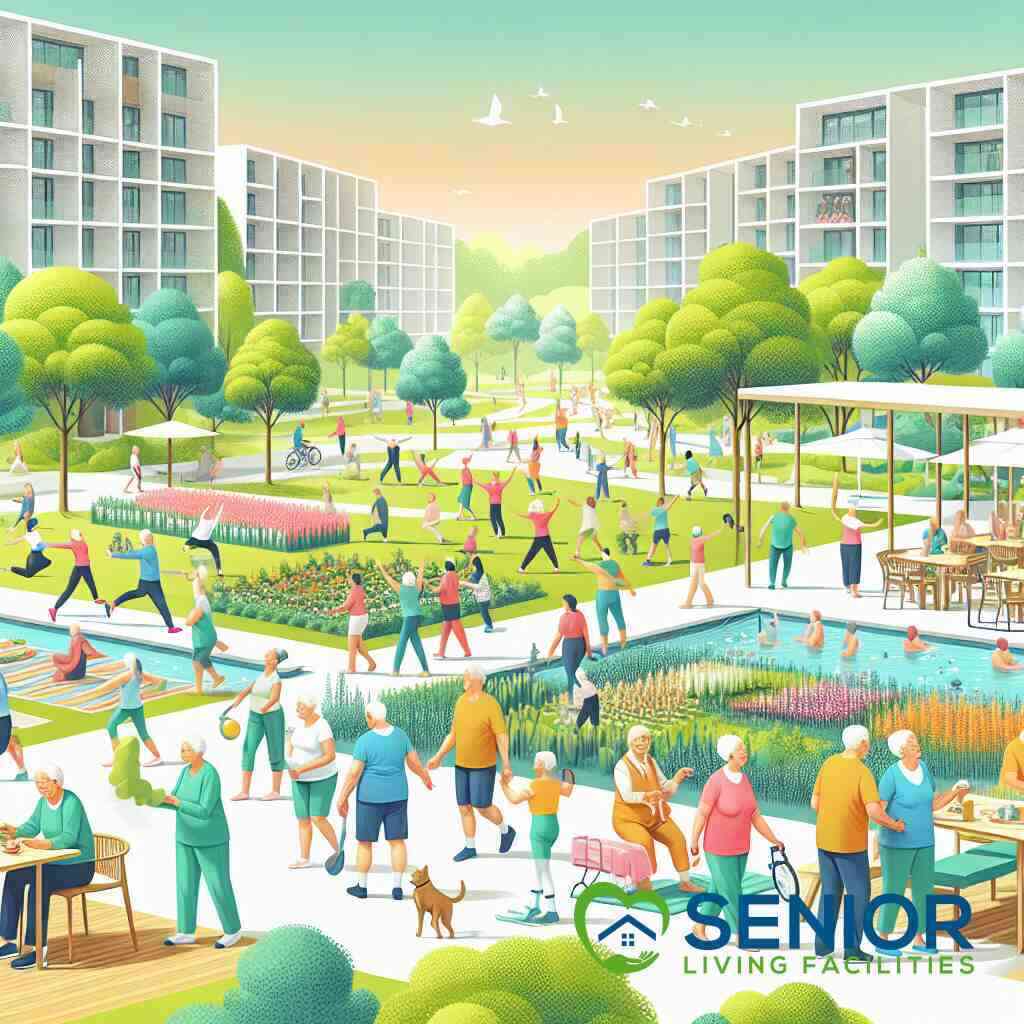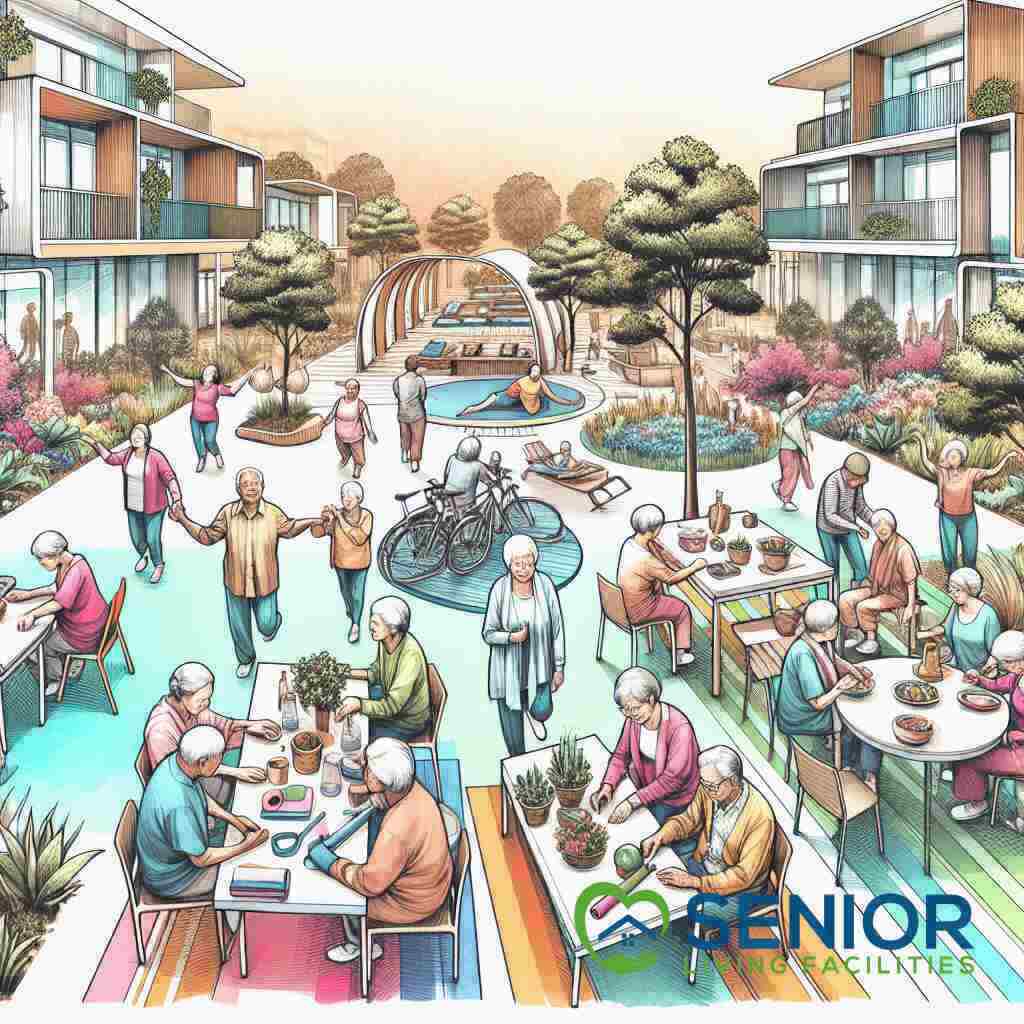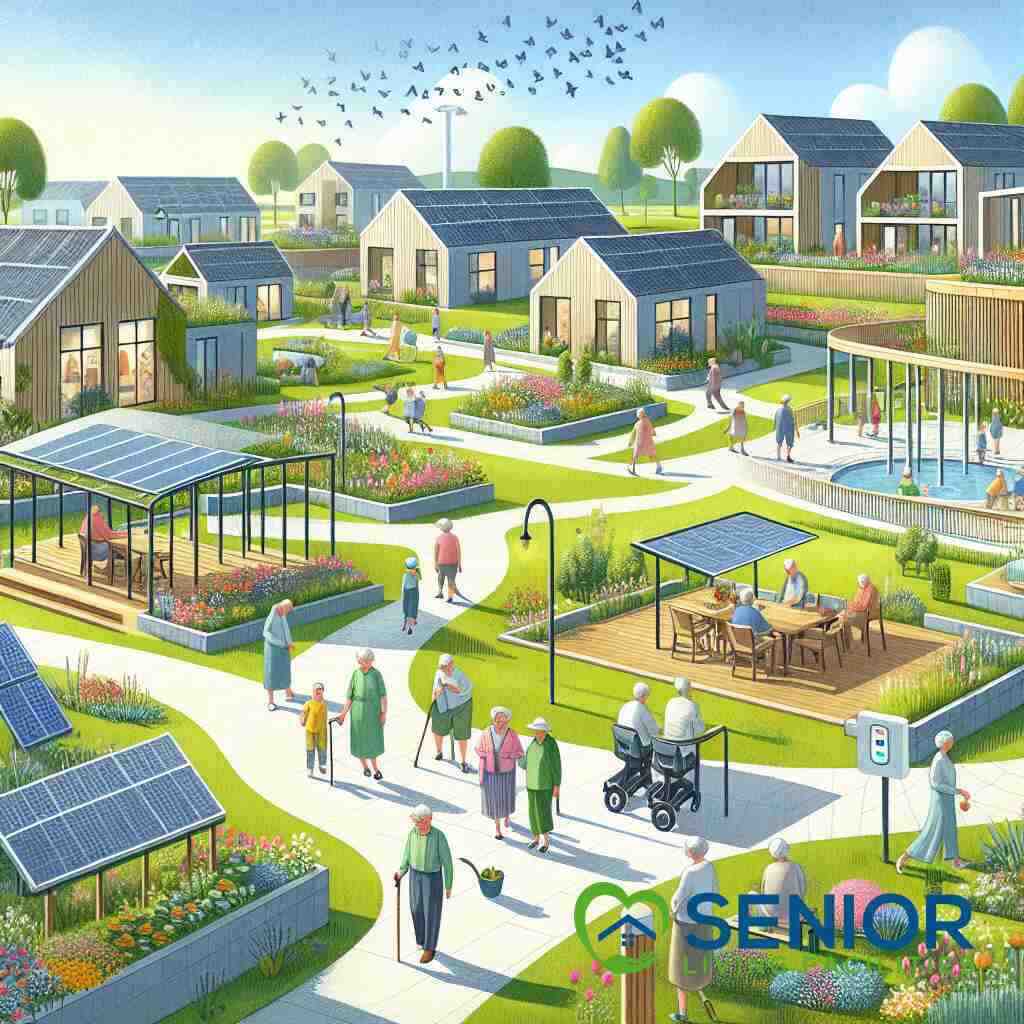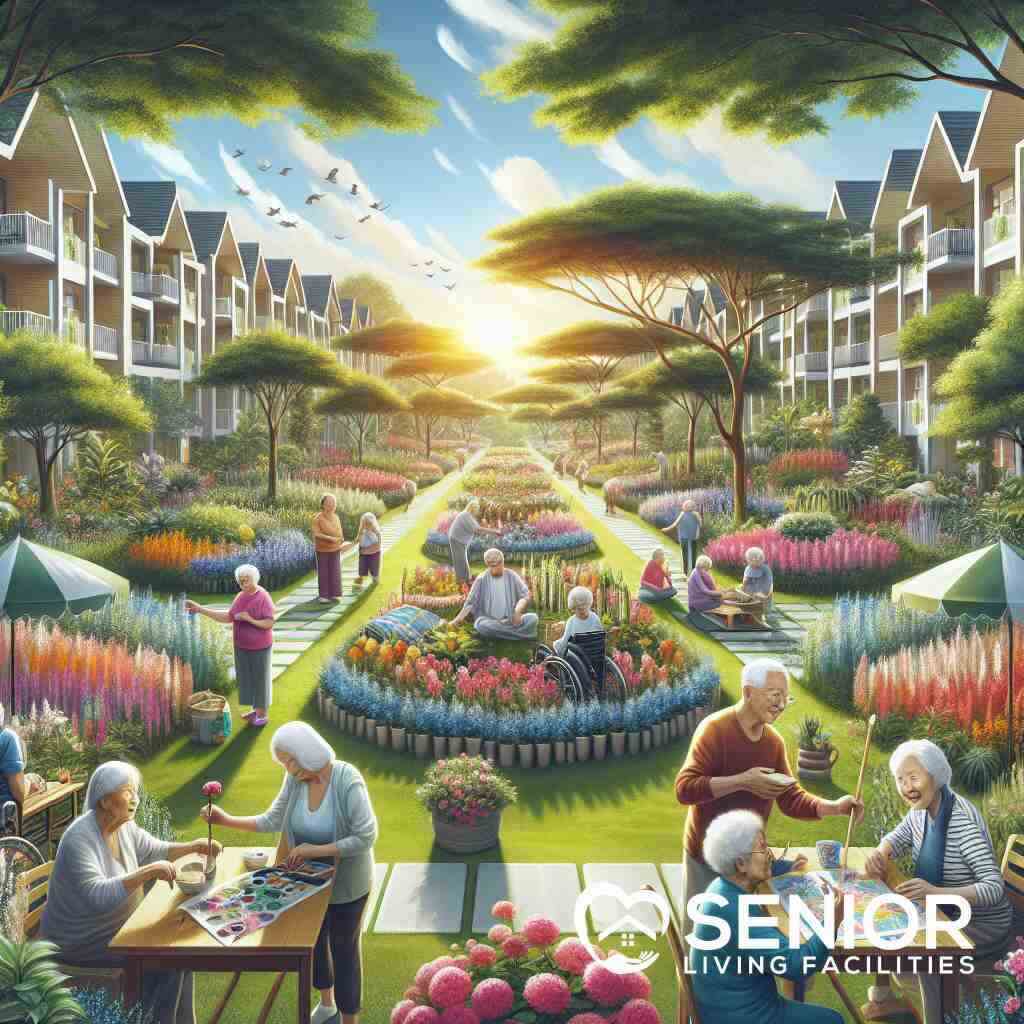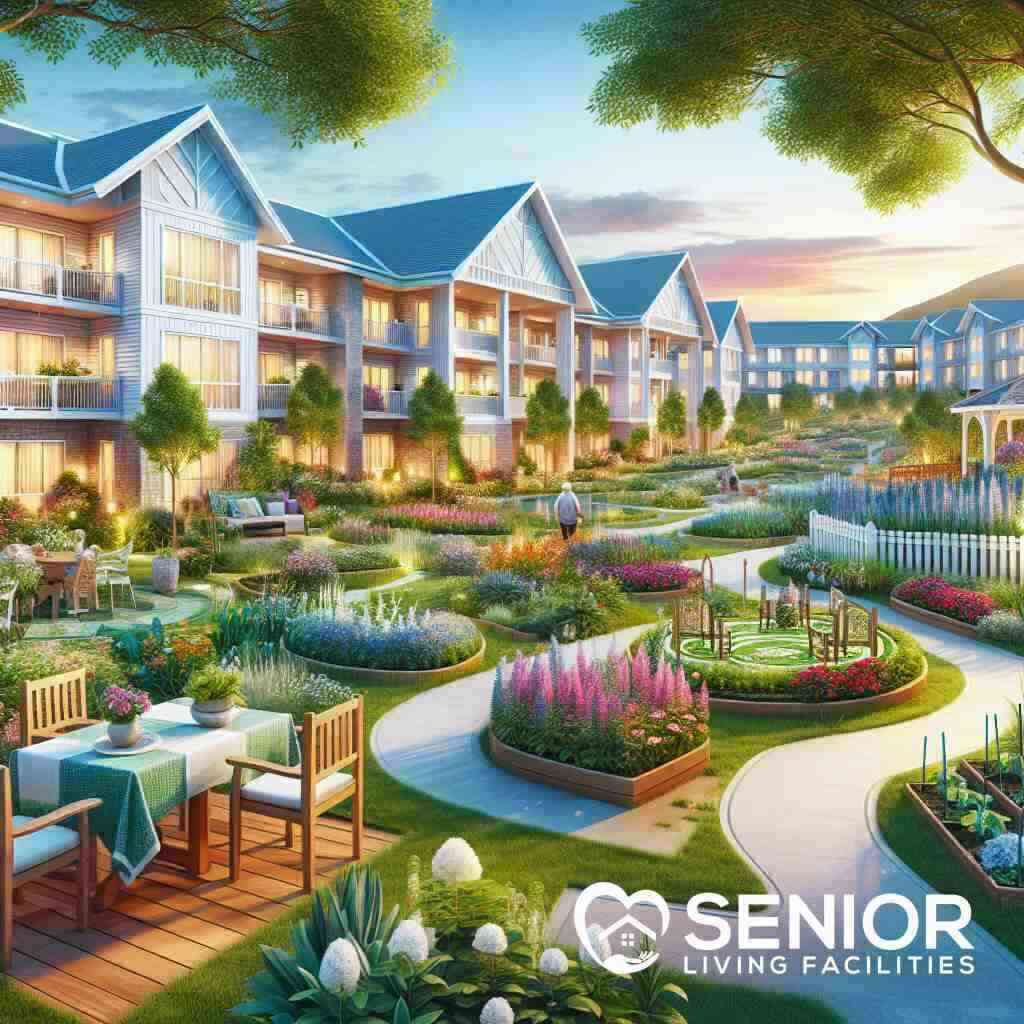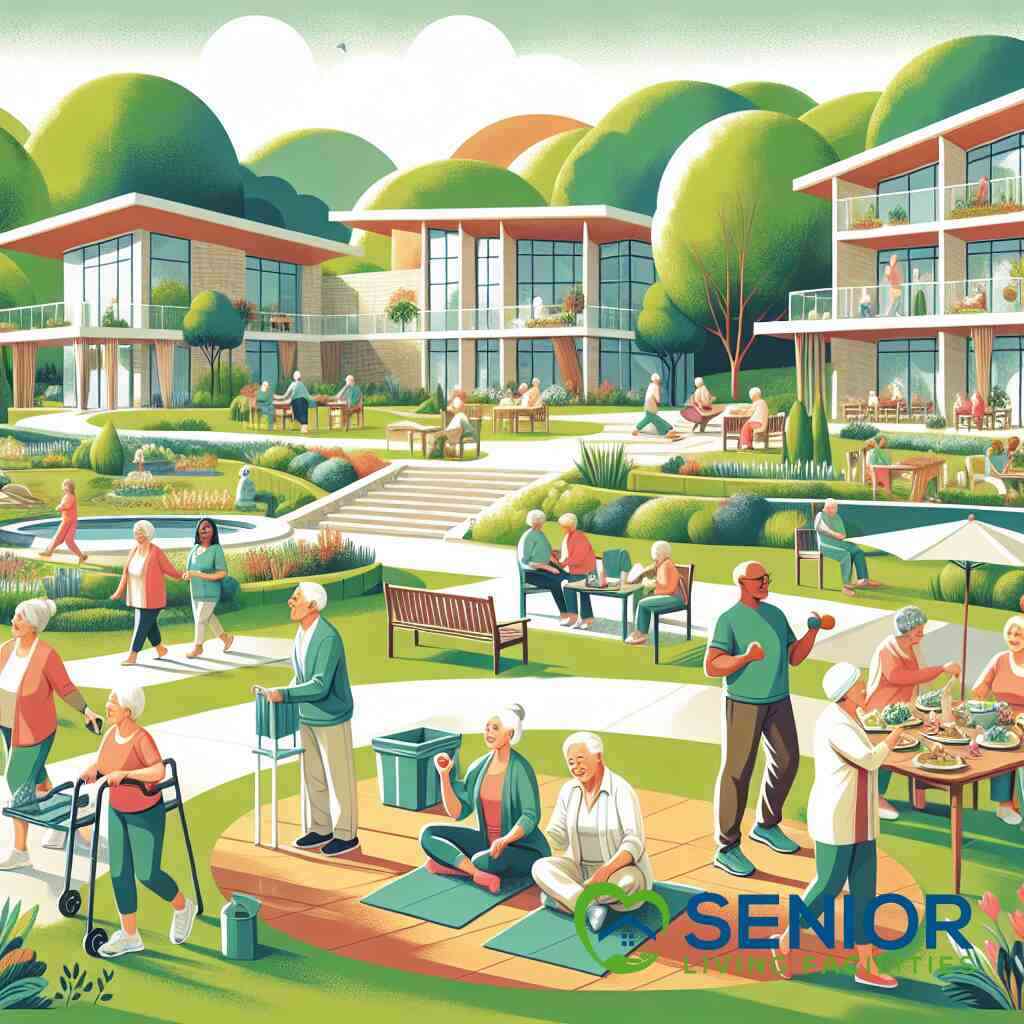
How Senior Living Facilities Enhance Daily Wellbeing?
October 29, 2024
Reimagining Senior Living for Enhanced Wellbeing
Understanding the Evolution of Senior Care
In recent decades, senior care has rapidly evolved, shifting from a focus solely on physical health to embracing a more comprehensive approach that emphasizes emotional, social, and mental wellness in senior living. This paradigm shift acknowledges the importance of fostering a sense of community and belonging among seniors, recognizing that loneliness and isolation can be as detrimental to health as physical ailments. Current trends prioritize creating environments that encourage social interaction and active lifestyles, thereby enhancing well-being in senior communities. Facilities now incorporate holistic strategies aimed at nurturing all aspects of senior health, thus transforming the traditional perception of elder care.
The Modern-Day Senior Living Facility
Today’s senior living facilities are far from the institutional settings of the past. The Difference Between Assisted and Independent Living They are dynamic communities offering diverse housing options for seniors, including independent living, assisted living, and memory care. These facilities focus on creating an environment where seniors can thrive physically, socially, and emotionally. Amenities such as fitness centers, dining venues, and arts and crafts workshops are tailored to promote a vibrant daily life. Top 5 Senior Living Amenities for Comfortable Living The integration of technology further supports this modern approach by enhancing communication and providing health monitoring tools. The emphasis on activities and enrichment in senior spaces ensures that each resident has opportunities for meaningful engagement every day.
The Role of Senior Living Facilities in Today’s Society
Senior living facilities play a crucial role in modern society by addressing the unique needs of an aging population. They not only offer a solution to the physical and healthcare needs of seniors but also provide opportunities for social connection and community involvement. These communities act as a hub of activity and engagement, fostering relationships among residents while integrating them with the broader community through volunteerism and interaction with local events. Additionally, they serve as a support system for families, offering peace of mind by ensuring their loved ones receive personalized care and attention. As the demand for senior housing grows, these facilities are instrumental in shaping how society perceives and supports its older citizens, redefining what defines a retirement community into a more dynamic and inclusive concept.
A Holistic Approach to Senior Wellness
Physical Health: Active Senior Lifestyle
Staying physically active plays a pivotal role in enhancing the daily well-being of seniors. Senior living facilities are designed to offer a plethora of activities that cater to diverse interests and physical capabilities. From nature walks and yoga classes to more structured physical training sessions, these activities aim to promote cardiovascular health, strength, flexibility, and balance. Emphasizing an active senior lifestyle not only reduces the risk of chronic diseases but also contributes to improving mental health by releasing endorphins and fostering a sense of accomplishment. Facilities continually strive to adapt and introduce new programs that meet the evolving interests and health needs of their residents, ensuring that seniors remain engaged and motivated to pursue a healthier lifestyle.
Mental Health and Memory Care
Ensuring mental wellness in senior living communities is crucial, with memory care programs tailored to support cognitive health. These programs incorporate activities like puzzles, reading clubs, and educational seminars that keep the mind active and engaged. Facilities also utilize specialized environments designed to reduce confusion and promote tranquility for those experiencing memory loss, such as residents with Alzheimer’s or dementia. Personalized therapies focus on enhancing memory function, providing a sense of familiarity and comfort. Creating supportive Community environments not only fosters emotional resilience but also facilitates meaningful social connections that are instrumental in maintaining mental wellness in senior living settings.
Integrative Nutrition Plans for Seniors
Customized nutrition plans play a vital role in the well-being of seniors, addressing unique dietary requirements necessary for optimal health. Senior living facilities prioritize integrative nutrition plans that offer balanced, nutrient-rich meals designed to meet the dietary preferences and medical needs of their residents. Nutritionists and dietary specialists work closely with chefs to create menus that not only support medical conditions like diabetes or heart disease but are also flavorful and varied to keep meals appealing and enjoyable. Such thoughtful dining experiences are integral to sustaining physical health and enhancing the overall quality of life in senior communities, promoting vitality through holistic dietary practices.
The Importance of Preventative Health for Seniors
Preventative health programs for seniors are critical in maintaining long-term well-being and reducing the likelihood of serious health issues. These programs encompass regular health screenings, immunizations, and wellness evaluations that help identify potential risks before they lead to critical health conditions. Facilities emphasize the importance of preventative health by fostering environments where regular check-ups and health education are encouraged. They employ dedicated healthcare professionals to ensure seniors receive the necessary care and guidance to maintain optimal health. Implementing such programs reflects a proactive approach, promoting longevity and enhancing the quality of life for seniors through informed healthcare practices. By fostering holistic well-being for elderly individuals, senior living facilities aim to create a supportive ecosystem where every resident can thrive physically, mentally, and emotionally, paving the path for a fulfilling life in their golden years.
Creating a Vibrant Daily Life Through Meaningful Engagement
Social Interaction: Building Community Connections
Fostering meaningful social interactions is a cornerstone of enhancing daily well-being for seniors. Senior living communities prioritize creating spaces and opportunities where residents can build enduring relationships. This focus on social interaction in senior facilities helps dissipate feelings of loneliness and promotes emotional well-being. Planned community events, such as game nights, shared meals, and discussion groups, provide residents with platforms to connect naturally. Beyond scheduled activities, the communal areas in senior living facilities are intentionally designed to encourage spontaneous meetings and conversations, thereby nurturing a welcoming environment for new friendships.
Moreover, the emphasis on emotional and social support for seniors encourages a sense of belonging and community. Participating in group activities amplifies these bonds, contributing to a holistic support network that enhances quality of life. As seniors partake in these interactions, they stimulate cognitive and emotional faculties, leading to improved mental health and satisfaction. Through these efforts, senior living communities ensure every resident is an integral part of their vibrant society.
Cultural and Recreational Activities
Cultural and recreational activities serve as vital elements in promoting a fulfilling lifestyle in senior living communities. By engaging seniors in culturally enriching experiences, communities provide avenues for continued learning and exploration. Facilities often host events such as art exhibitions, musical performances, and cultural festivals, offering residents opportunities to immerse themselves in diverse global traditions. Such activities not only broaden horizons but also create shared experiences that strengthen social ties among residents.
Recreational activities are equally crucial, enhancing the daily enrichment of the elderly through physical and mental stimulation. Organized classes in dance, yoga, and woodworking are popular choices designed to cater to various skill levels and interests. Through interactive workshops and group sessions, seniors remain actively engaged, exploring new hobbies and refining existing talents. This spectrum of activities ensures a comprehensive approach to recreational engagement, promoting both physical activity for seniors and mental stimulation, which are key components of holistic well-being.
Life Enrichment Programs: Promoting Autonomy
Life enrichment programs in senior living facilities focus on empowering residents by promoting autonomy and personal freedom. These programs are tailored to nurture individual interests and passions, offering a personalized approach to engagement. By encouraging seniors to take ownership of their activities and daily routines, life enrichment programs play a vital role in enhancing self-esteem and confidence. Ultimate Review of Independent Living in Texas
Promoting autonomy involves offering a wide range of classes and workshops that honor personal preferences and goals. From do-it-yourself projects to continuing education courses, these programs inspire lifelong learning and personal development. The aim is to provide environments where seniors can pursue their interests in a supportive setting that acknowledges their desires for control over their own lives. By prioritizing independence while providing a safety net of support, these programs exemplify the commitment of senior living facilities to cultivate an empowered and fulfilling lifestyle for all residents.
In addition to fostering personal growth, life enrichment programs enrich the collective atmosphere of senior communities. As residents share their experiences and achievements with peers, a culture of mutual encouragement and camaraderie is reinforced. The integration of these aspects into daily life ensures a vibrant and dynamic community where every senior can thrive.
Enhancing Quality of Life with Comprehensive Care Services
Personalized Senior Care and Healthcare Coordination
Modern senior living facilities emphasize personalized senior care to cater to the unique needs of each resident. By deploying expert teams for healthcare coordination, these facilities ensure every senior receives timely medical attention and comprehensive care plans. Personalized care addresses not just the medical aspects but also the lifestyle preferences, helping seniors maintain their independence while receiving the support they need. This approach involves collaboration with primary healthcare providers, integrating new treatment options, and regular health monitoring, making it a cornerstone of enhancing daily well-being for seniors. Such personalized attention fosters a stable environment where seniors thrive, knowing their health needs are proactively managed.
In addition to medical support, senior living communities focus on personalized lifestyle plans. These encompass dietary preferences, activity schedules, and social engagements, ensuring each resident’s daily routine aligns with their interests. By prioritizing individual preferences, these communities empower seniors to take an active role in their day-to-day lives, promoting autonomy and life satisfaction. Moreover, continual assessments and feedback loops refine these personalized strategies, adapting to evolving health conditions and lifestyle changes.
Therapeutic Activities and Emotional Support
Therapeutic activities within senior living facilities play a vital role in enhancing residents’ emotional and mental well-being. These activities range from art therapy and music sessions to therapeutic support for seniors, like pet therapy, designed to provide comfort and emotional resilience. Music therapy, for instance, can evoke memories and stimulate cognitive functions, while art activities encourage self-expression and creativity, reducing stress and fostering a sense of accomplishment.
Emotional support structures are equally critical, with counseling services and group therapy sessions readily available to residents. These services provide safe spaces for seniors to express concerns and gain emotional release. They are essential in building resilience against the challenges of aging, ensuring that residents feel heard and supported emotionally. In senior living communities, such therapeutic support is integrated into daily schedules, promoting a balanced lifestyle that recognizes the intrinsic link between emotional health and overall quality of life.
Community peers and staff also contribute to emotional well-being by fostering an inclusive and accepting environment. Senior residents are encouraged to nurture peer-to-peer support networks, enhancing social bonds and creating a net of understanding and empathy across the community. This level of emotional engagement is crucial for residents to navigate the emotional complexities of aging with dignity and grace.
Health Services and Long-Term Care Facilities
Senior living communities champion the integration of extensive health services to meet the varying needs of their residents. They offer a robust network of health services in senior living, including on-site medical care, rehabilitation services, and emergency response systems, ensuring immediate care accessibility. Such services are crucial for handling both routine medical needs and unforeseen health crises. Facilities often collaborate with local hospitals and specialists to streamline processes for a continuum of care, bridging the gap between everyday wellness and specialized medical attention.
Long-term care facilities within these communities provide a comprehensive option for residents who require more intensive support. These facilities deliver a higher level of care tailored to individuals with chronic conditions or advanced age-related challenges. By maintaining resources like skilled nursing professionals and state-of-the-art medical equipment, long-term care facilities ensure residents receive the attention and medical intervention necessary to enhance longevity and quality of life. Such settings are crucial for fostering a sense of security and trust within senior communities, highlighting the commitment to comprehensive healthcare.
Moreover, robust preventive measures and health education initiatives empower seniors to make informed lifestyle choices, aligning with the broader agenda of preventative healthcare. Educational workshops and regular health screenings engage residents in proactive health strategies, emphasizing the importance of maintaining physical and cognitive health throughout aging. Through these comprehensive care services, senior living facilities strive to create a sanctuary of well-being, balancing independence with necessary support.
Empowering Independent Senior Lifestyles
Independent Living Communities vs. Assisted Living
Understanding the distinction between independent living communities and assisted living is essential for seniors evaluating their lifestyle options. Independent living communities cater to seniors who are self-sufficient and seek a vibrant social environment without the added service of extensive daily care. These communities feature amenities such as housekeeping, meal services, and recreational activities, focusing on fostering an active senior lifestyle. In contrast, assisted living facilities offer additional support with daily tasks like bathing, medication management, and mobility assistance, catering to individuals who require more care. When examining assisted versus independent living in North Carolina, seniors should weigh personal preferences and healthcare needs to determine the most suitable option for themselves.
Each model presents unique benefits that significantly enhance the quality of life, offering tailored environments where seniors can experience autonomy or the necessary assistance as their needs evolve. Senior living facilities emphasize personal choice, thus providing families with peace of mind that their loved ones receive the right level of care and engagement. As seniors consider their living options, understanding the core differences helps in making informed choices that align with personal lifestyle goals and health requirements.
Housing Options: Senior Apartment Rentals and Beyond
Across the United States, a multitude of housing options exist for seniors seeking independence while accessing community resources. One popular choice is senior apartment rentals, providing age-friendly living with access to social amenities that foster community interaction. These rentals are often designed with older adults in mind, featuring accessible designs and strategic locations close to shops and services. In a bustling state like New York, exploring housing options for seniors in New York unveils a variety of rental communities, from budget-friendly options to luxury residences offering premium lifestyle features.
Beyond traditional rentals, seniors can explore co-housing opportunities, where shared spaces and joint activities create a familial living environment. This model encourages collaboration among residents, strengthening community bonds and shared responsibilities. Moreover, new trends like age-restricted communities offer tailored services catering to common interests and lifestyles, aligning with the pursuit of specialized housing solutions. These varied housing configurations enable seniors to select living arrangements that best suit personal and financial circumstances while maintaining community engagement.
Promoting Autonomy and Personal Freedom in Senior Living
Promoting autonomy and personal freedom is the essence of modern senior living, empowering seniors to take control of their daily lives while having access to necessary support networks. Senior living communities implement strategies that prioritize individuality, encouraging residents to engage in activities that interest them. Life enrichment programs focus on providing choices, from dining experiences to participating in crafting or learning workshops, ensuring residents can pursue personal passions.
Services that promote autonomy also emphasize flexible scheduling, allowing residents to shape their daily routines according to their preferences. Communities provide resources for personalized healthcare management, accommodating the diverse wellness needs of seniors. The focus on autonomy extends to the subtle encouragement of decision-making, where seniors have the opportunity to voice preferences regarding community activities or accommodation arrangements.
By elevating autonomy in senior living, facilities instill a greater sense of independence and confidence among residents, encouraging a proactive approach to aging gracefully. This empowering environment highlights the facilities’ commitment to nurturing vibrant, self-directed lives, ensuring that seniors not only reside in such communities but thrive within them, imbued with purpose and fulfillment.
The Importance of Community Involvement for Seniors
Fostering Community Connections Among Seniors
Encouraging community connections among seniors is crucial for enhancing daily well-being. Senior living facilities prioritize creating a vibrant social fabric that fosters meaningful relationships. This sense of community minimizes feelings of loneliness and enhances mental and emotional health. Planned activities, such as group yoga, shared gardens, and community dinners, provide avenues for social engagement. These interactions are foundational in building trust and solidarity, offering seniors a sense of belonging and purpose.
Spontaneous interactions are equally important, often occurring in well-designed communal spaces within senior living facilities. These areas serve as informal hubs where residents can gather naturally, enhancing their social environment. In thriving senior living communities, there is a focus on interconnected living spaces that facilitate daily social stimulation. Such commitment to fostering connections underscores the holistic approach to enhancing well-being in senior communities.
Community Engagement: Volunteerism and Leadership Roles
Volunteerism and leadership roles stand out as impactful avenues for senior engagement. Through structured volunteer programs, seniors have the opportunity to contribute to their broader community, instilling a sense of purpose and fostering invaluable skills. By participating in volunteer activities, seniors enrich their own lives while promoting a culture of positive engagement within their living environments.
Senior living communities often provide platforms for residents to assume leadership roles, offering positions in community boards, event planning committees, and other organizational structures. This empowers seniors to influence community decisions and enhance their personal growth. These initiatives not only support emotional well-being but also develop a collective spirit of service and responsibility, leading to more cohesive and empowered communities.
Facilitating Social Responsibility and Connectedness
Promoting social responsibility and connectedness is essential in fostering a holistic living experience for seniors. Senior living facilities encourage residents to take on responsibilities that benefit both the immediate community and the external environment. This might involve organizing sustainability practices, community cleanliness drives, or educational workshops focused on global awareness.
Such activities build stronger community ties and maintain a focus on the broader implications of social involvement. In fact, fostering community involvement in senior living not only enhances personal satisfaction but also aids in societal development. Recognizing the unique contributions seniors make underscores the value of integrating active participation into their daily lives, further cementing their role as vital contributors to community wellbeing.
These intentional practices in senior living communities cultivate a rich environment where seniors find meaning and fulfillment, reinforcing their place within the broader social fabric.
Advancements in Senior Living Facilities
The Role of Technology in Enhancing Wellbeing
Modern technology significantly enhances well-being in senior living facilities by streamlining care and fostering social connections. Senior communities utilize digital platforms that enable residents to stay in touch with family and friends, eliminating feelings of isolation. Wearable health monitors track vital signs, allowing healthcare professionals to address health concerns promptly. This integration of technology offers peace of mind for families, knowing their loved ones are under constant care and supervision. Additionally, technologies like virtual reality introduce innovative ways for residents to explore the world and engage with new experiences, expanding their daily enrichment for the elderly. The adoption of modern healthcare in senior living heralds a future where technology continues to enhance daily well-being, evolving alongside the needs of the aging population.
Sustainable Practices and Green Living Initiatives
Senior living communities embrace sustainability to create healthier environments and ensure longevity in resource availability. These initiatives include employing eco-friendly materials in construction and adopting energy-efficient systems. Facilities often incorporate gardening programs, encouraging residents to participate actively actively in sustainable practices. Such programs not only offer physical activity for seniors but also foster a sense of purpose and community involvement. Water conservation and solar energy integration are common practices, affirming a commitment to reducing environmental footprints. Moving towards enhancing well-being in senior communities, these facilities recognize the importance of nurturing not only their residents but also their surroundings, paving the way for environmentally responsible senior lifestyles.
Innovations in Senior Healthcare Coordination
Advancements in healthcare coordination transform how senior living facilities address resident well-being, focusing on personalized and streamlined medical care. Utilizing comprehensive health records and specialized care programs, these facilities enhance the quality of life in senior communities by ensuring tailor-made healthcare services. Senior living innovations include integrative platforms that facilitate communication between healthcare providers, residents, and family members, ensuring transparency in care plans. Moreover, telehealth services offer convenient access to specialists, eliminating transportation barriers for elderly individuals. These developments reflect a proactive stance on healthcare, aiming for holistic well-being for elderly individuals by integrating cutting-edge medical technologies and methodologies to anticipate and meet their healthcare needs proactively.
Creating a Culture of Wellbeing in Senior Living Communities
Senior Wellness Activities and Recreational Opportunities
Senior living communities prioritize a culture of wellness by offering diverse recreational opportunities tailored to residents’ wellbeing. Facilities strategically design programs that align with the interests and abilities of older adults, ensuring accessibility to everyone. Yoga classes and tai chi sessions emphasize relaxation, balance, and mindfulness, which are vital for senior wellness activities. Simultaneously, art and music therapy cultivate creativity and mental stimulation, which are crucial for enhancing the overall quality of life. Engaging in such activities not only fosters social connections among residents but also plays a pivotal role in emotional support for older adults. By integrating activities that promote physical activity for seniors alongside cognitive engagement, communities ensure their residents thrive, embracing active seniors’ lifestyles enthusiastically while enhancing their daily enrichment.
Promoting Emotional Wellbeing and Stability
Emotional resilience and stability form the bedrock of thriving senior communities. Facilities foster environments where mental wellness in senior living is prioritized through programs designed to support emotional health. Group therapy and peer support sessions provide platforms for open dialogues and shared experiences, offering emotional sustenance and a sense of belonging. The incorporation of tranquility gardens and meditation rooms aids seniors in achieving inner peace, reducing stress, and fostering emotional well-being. Staff with specialized training in mental wellness provide invaluable support, recognizing and addressing the nuanced needs of each resident. Such dedicated focus on emotional health ensures that seniors not only maintain mental stability but also enjoy enriched lives full of satisfaction and comfort in their communities.
Transforming Senior Living into Thriving Communities
Transforming senior living spaces into thriving communities requires a holistic approach that integrates all facets of senior care. Facilities aim to create vibrant environments that promote physical, mental, and social well-being, ultimately redefining what defines a retirement community. By prioritizing community involvement in senior living, these spaces evolve into centers for engagement and growth. Regular workshops, educational seminars, and leadership roles invite seniors to contribute actively, influencing their surroundings and fostering a sense of ownership. The transformation is palpable when residents feel empowered and included, driving the shift from mere residency to dynamic, flourishing communities. Why Choose Senior Living Communities in California? Such initiatives underscore the commitment to creating a culture where every resident can embrace life with purpose, autonomy, and sheer joy in their golden years. Exploring options in California senior facilities exemplifies the diverse spectrum of community involvement available, showcasing how tailored senior wellness programs translate into thriving environments across different locales.
Unleashing Potential through Enhanced Daily Wellbeing
Cultivating a Life of Purpose and Meaning
Cultivating a purposeful life is fundamental to enhancing the daily well-being of seniors in modern communities. A focus on elder wellness programs provides numerous opportunities for residents to engage in activities that resonate personally, fostering a deeper sense of fulfillment. Through these programs, seniors can learn new skills, indulge in cherished hobbies, or participate in volunteer activities. Such meaningful engagement for the elderly enhances not only their personal growth but also provides a platform for expressing individuality in vibrant settings. Senior living facilities prioritize an environment that encourages exploration and self-discovery, ensuring each day offers a new opportunity for purpose-driven living.
Encouraging independent choices and fostering autonomy is central to nurturing seniors’ sense of purpose. Facilities often incorporate resident-led initiatives, where seniors themselves lead community projects or clubs. This empowerment enhances life in independent senior communities and nurtures leadership qualities among residents. By promoting active involvement, senior living communities ensure that each member feels valued and integral to the collective dynamic. Through these practices, facilities ensure that the golden years are characterized by purpose and satisfaction, enriching their quality of life.
Transformative Impact on Elderly Wellbeing
The transformative impact of senior living facilities on elderly well-being is profound. By integrating comprehensive care and vibrant communities, these facilities create environments where seniors can thrive emotionally, physically, and socially. Emotional support for older adults plays a pivotal role, with accessible support systems designed to address individual needs. Senior wellness programs focus on holistic well-being for elderly individuals, weaving together mental, physical, and social enrichment activities that cater to diverse interests and capabilities. This symbiotic approach ensures that seniors experience a balanced and fulfilling lifestyle, reinforcing their confidence and resilience.
Facilities continually innovate to address evolving needs through personalized senior care. Implementing progressive strategies enhances seniors’ quality of life, accommodating health and lifestyle changes seamlessly. Specialized programs target specific wellness domains, such as mental health or nutrition, to bolster resident happiness and vitality. These efforts aid in crafting a transformative experience that aligns with each senior’s evolving aspirations and health requirements, enhancing their overall satisfaction and well-being within the community.
The Future of Senior Living Communities
As we look towards the future, senior living communities are poised to become even more dynamic and responsive to their residents’ needs. The advancements in technology and healthcare coordination position these communities as forerunners in enhancing daily enrichment for seniors. Technology will play an increasing role, offering expanded healthcare options and fostering connectivity and engagement across distances. This evolution will ensure that seniors remain connected to family and friends, fostering mental wellness in senior living communities.
Sustainability and innovation will also shape the future of senior housing. As communities embrace environmentally friendly practices and advanced healthcare solutions, they redefine what defines a retirement community. The integration of green living initiatives aligns with a broader commitment to ensure that communities are not only wellness-focused but also environmentally responsible. Embodying these values, facilities will continue to pioneer new pathways to support and enrich the lives of their residents in meaningful ways, creating thriving, forward-thinking environments that echo the changing landscape of senior living.
With new trends already emerging in various locales, such as navigating senior living options in Minnesota, there is a clear indication that the future will embrace personalization, comfort, and sustainability. These communities stand ready to adapt and evolve, offering seniors a life filled with opportunity, respect, and fulfillment.
Frequently Asked Questions
Question: How do Senior Living Facilities focus on enhancing daily well-being for seniors through their programs?
Answer: Senior Living Facilities place a high emphasis on enhancing the daily well-being of seniors by integrating a wide range of programs that support physical, emotional, and mental health. By offering diverse senior wellness activities such as tailored exercise classes, art therapy, and social interaction in senior facilities, they ensure that residents engage in meaningful engagement that enriches their daily lives. The Best Fitness Programs in Senior Living Communities Additionally, personalized senior care and comprehensive health services in senior living facilities provide targeted support, addressing individual health needs and preferences. These holistic senior well-being programs foster a vibrant lifestyle, encouraging seniors to thrive in a community that understands and anticipates their needs.
Question: How do Senior Living Facilities incorporate technology to support mental health in senior living communities?
Answer: Senior Living Facilities leverage modern technology to enhance mental health in senior living environments by integrating digital tools that promote connectivity and mental stimulation. Technologies such as wearable health monitors and virtual reality sessions play a pivotal role in maintaining and enhancing the quality of life in senior communities. These tools provide continuous health monitoring, ensuring caregivers can promptly address any health concerns. Meanwhile, virtual reality offers innovative therapeutic activities for seniors, allowing them to experience new adventures from the comfort of their community. This comprehensive approach to integrating technology fosters a connected and enriching environment for senior residents, supporting both their physical and mental health needs. Ultimate Guide to Tech-Savvy Senior Living in 2024
Question: In the blog How Senior Living Facilities Enhance Daily Wellbeing? What role do life enrichment programs play in promoting autonomy for elderly residents?
Answer: In the blog How Senior Living Facilities Enhance Daily Wellbeing? Life enrichment programs are highlighted as essential in promoting autonomy and personal freedom for elderly residents. Exploring Memory Care Options in Senior Living Facilities: These programs are designed to empower seniors by allowing them the freedom to pursue interests and activities that align with their passions and aspirations. For instance, seniors can participate in activities ranging from do-it-yourself workshops to educational courses, enhancing their knowledge and skill set. This focus on promoting autonomy for elderly residents ensures that they maintain control over their daily routines and decision-making processes, which is crucial for boosting their confidence and satisfaction. What Does Independent Living Mean? An In-Depth Look Senior Living Facilities prioritize independent senior lifestyles by offering a supportive environment where residents can flourish with dignity and purpose.
Question: How do Senior Living Facilities support community involvement for seniors to reduce isolation and boost emotional well-being?
Answer: Senior Living Facilities recognize the importance of community involvement for seniors as a key component in reducing isolation and enhancing emotional support for older adults. By fostering an environment rich in social interaction in senior facilities, residents are encouraged to participate in communal activities like shared meals, garden projects, and cultural events. This sense of community helps alleviate loneliness and fosters meaningful relationships among residents. Moreover, the encouragement of volunteerism and leadership roles empowers seniors, providing them with opportunities to contribute to their community. Finding the Right Senior Living in Georgia for You Through these initiatives, Senior Living Facilities cultivate a nurturing and dynamic social environment that enhances emotional well-being and community connectivity.
Question: How do Senior Living Facilities ensure personalized senior care is offered to meet the diverse health needs of their residents?
Answer: Senior Living Facilities are deeply committed to offering personalized senior care that meets the individual health needs of all residents. By deploying dedicated healthcare coordination teams, they ensure that each senior receives tailored medical attention and lifestyle plans that align with their specific requirements. This approach involves collaboration with healthcare providers and ongoing health assessments to adapt care plans as needed. Facilities emphasize the integration of personalized lifestyle plans, which include customized nutrition plans and activity schedules to match resident preferences. Such exhaustive efforts in providing personalized care reflect Senior Living Facilities’ dedication to maintaining optimal health and well-being for their seniors, ensuring they lead fulfilling and independent lives.
